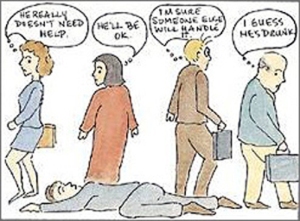 I took a few Psychology classes in Junior College back in the day. I really enjoyed them, enough to even entertain thoughts of studying Psychology. There are a few things that have stuck with me since then, such as the Stanford prison experiment and the story of Kitty Genovese. In short (as according to Wikipedia) Kitty was murdered on March 13th 1964 in New York. During the attack she screamed for help but no one came to her aid, but a few people did call the police. The incidence caused a great deal of outrage and since then a number of psychological studies have shown that the more people witness something like this, the less likely they are to intervene. This has been called the Bystander Effect.
I took a few Psychology classes in Junior College back in the day. I really enjoyed them, enough to even entertain thoughts of studying Psychology. There are a few things that have stuck with me since then, such as the Stanford prison experiment and the story of Kitty Genovese. In short (as according to Wikipedia) Kitty was murdered on March 13th 1964 in New York. During the attack she screamed for help but no one came to her aid, but a few people did call the police. The incidence caused a great deal of outrage and since then a number of psychological studies have shown that the more people witness something like this, the less likely they are to intervene. This has been called the Bystander Effect.
So what causes this sad phenomenon? When a crowd of people witness the same event, something called a diffusion of responsibility takes place where people don’t feel that they need to take action, precisely because there are other people there. They all assume that they don’t have to do anything because someone else will. Sadly this often leads to complete inaction on everyone’s part and can have terrible consequences. Another reason why people don’t react is because they see that others aren’t doing anything and therefore assume that they shouldn’t either. This is especially common if it is difficult to determine what exactly is happening or who is the victim. However, it has been shown (by this study) that in a high danger situation the bystander effect is greatly diminished, likely because the situation is not as ambiguous as a low-danger situation (such as domestic abuse – not that domestic abuse is ambiguous, you know what I mean).
 According to the text books I read in Junior College studies had also shown that it was possible to counteract the Bystander Effect simply by letting people know about it. In the textbook there was an example of a study where a group of students was divided in two and sent into two class rooms. One group watched a movie about the Bystander Effect while the other watched a movie about something completely unrelated. When they left the class room an emergency was staged (someone had a seizure or fell and hurt themselves, I can’t remember) and the group who had watched the Bystander Effect movie was much quicker to react than the other group.
According to the text books I read in Junior College studies had also shown that it was possible to counteract the Bystander Effect simply by letting people know about it. In the textbook there was an example of a study where a group of students was divided in two and sent into two class rooms. One group watched a movie about the Bystander Effect while the other watched a movie about something completely unrelated. When they left the class room an emergency was staged (someone had a seizure or fell and hurt themselves, I can’t remember) and the group who had watched the Bystander Effect movie was much quicker to react than the other group.
The point of this post is not to debate psychology theories, but rather to inform people. I believe in being informed and I also believe that this particular piece of information is incredibly important. In fact, I think this should be covered on a regular basis in school so everyone is exposed to it at least once. It would make a world of difference.
So, get informed. Read more and stay alert.
And here’s a little something for the shock value: 10 Notorious Cases of the Bystander Effect.


